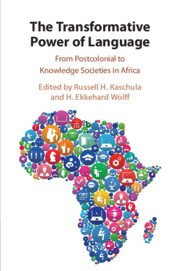Book contents
- The Transformative Power of Language
- The Transformative Power of Language
- Copyright page
- Contents
- Figures
- Tables
- Contributors
- Preface
- Abbreviations and Acronyms
- Introduction
- Part I Mental Decolonisation and Cultural Diversity
- 1 The Role of African Languages in Decolonising South African Universities
- 2 Adapt or Die
- 3 Decolonising Our Minds, Decolonising Our Languages
- Part II Multilingualism and Intellectualisation of African Languages
- Part III Digitalisation and Democratisation of Knowledge
- Part IV Interlingual and Intercultural Cross-Fertilisation
- Index
- References
3 - Decolonising Our Minds, Decolonising Our Languages
A Mentalist Approach to Language Attitudes
from Part I - Mental Decolonisation and Cultural Diversity
Published online by Cambridge University Press: 18 September 2020
- The Transformative Power of Language
- The Transformative Power of Language
- Copyright page
- Contents
- Figures
- Tables
- Contributors
- Preface
- Abbreviations and Acronyms
- Introduction
- Part I Mental Decolonisation and Cultural Diversity
- 1 The Role of African Languages in Decolonising South African Universities
- 2 Adapt or Die
- 3 Decolonising Our Minds, Decolonising Our Languages
- Part II Multilingualism and Intellectualisation of African Languages
- Part III Digitalisation and Democratisation of Knowledge
- Part IV Interlingual and Intercultural Cross-Fertilisation
- Index
- References
Summary
South Africa is well known for its multilingual and multicultural society. It is also famous for its constitution that guards against any form of discrimination. The aim of this chapter is therefore to examine the micro element of the indigenous African languages and how the meanings associated with blackness and whiteness reflect or shape the mental state of both hearers and speakers. Using the mentalist approach to understanding language, we examined data from social media as well as self-observation to study language attitudes associated with blackness and whiteness. We argue that the way in which language is used reflects and shapes feelings and behaviours. We further argue that language usage can be a tool of social control in further associating blackness with badness while glorifying whiteness.
Keywords
- Type
- Chapter
- Information
- The Transformative Power of LanguageFrom Postcolonial to Knowledge Societies in Africa, pp. 67 - 82Publisher: Cambridge University PressPrint publication year: 2020
References
References
Websites
- 3
- Cited by



